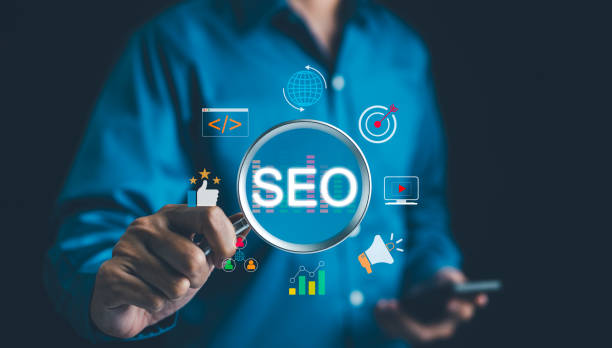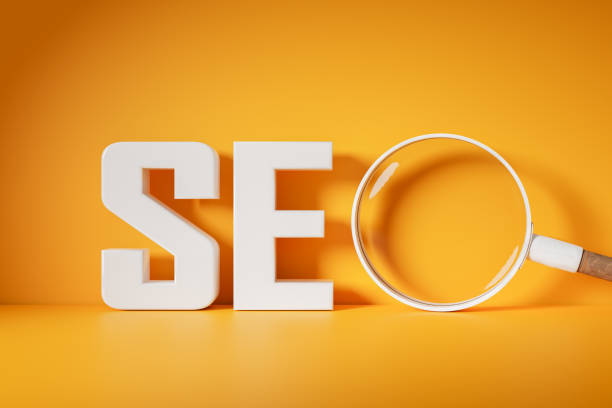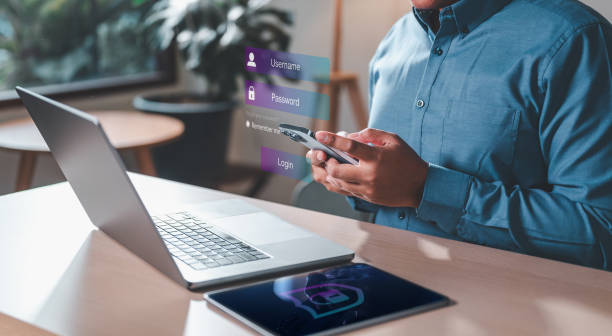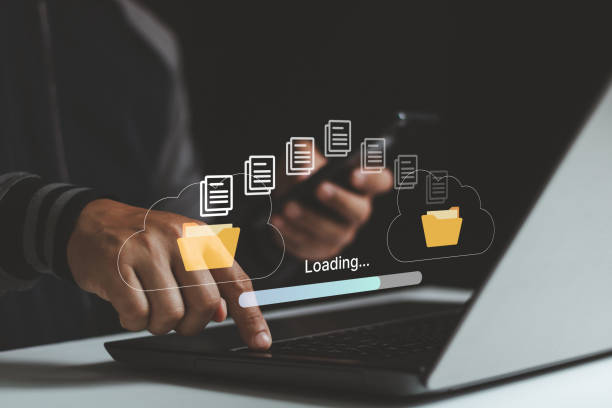What is SEO and Why is it Important?

What is SEO and Why is it Important?
#SEO stands for Search Engine Optimization.
SEO is a set of techniques and strategies used to improve a website’s ranking in search engine results like Google, Bing, and Yahoo.
SEO helps you optimize your website for keywords related to your business, so that when users search for these keywords, your website appears higher in the results.
The importance of SEO can be examined from several aspects:
- Increased Organic Traffic: SEO increases organic (unpaid) traffic to your website.
Organic traffic consists of visitors who reach your website through search results. - Increased Credibility and Trust: Websites that rank high in search results usually have more credibility and trust.
Users typically trust websites that appear on the first page of search results more. - Improved User Experience: SEO is not limited to optimizing for search engines but also includes improving user experience.
An SEO-optimized website should be fast, user-friendly, and easy to navigate. - Return on Investment (ROI): SEO is a long-term marketing strategy that can yield significant ROI.
By investing in SEO, you can continuously increase your traffic and sales. - Competitiveness: In today’s world, SEO is a necessity for businesses.
If you want to compete in the online market, you must optimize your website for search engines.
Are you bothered by losing customers who visited your site to make a purchase?
RasaWeb is your specialized solution for a successful online store.
✅ Significant increase in your online sales
✅ Building trust and professional branding with customers⚡ Get free consultation from RasaWeb experts!
Key Principles of On-Page SEO

Key Principles of On-Page SEO
On-Page SEO refers to the set of actions you perform within your website to improve its ranking in search engines.
These actions include optimizing content, HTML tags, site structure, and other factors related to your website.
Some key principles of On-Page SEO include:
- Keyword Research: First and foremost, you need to identify keywords relevant to your business.
Use tools like Ahrefs Keywords Explorer and SEMrush Keyword Magic Tool to find keywords with high search volume and low competition. - Title Tag Optimization: The page title is one of the most important On-Page SEO factors.
The page title should include the main keyword and a brief description of the page’s content. - Meta Description Optimization: The meta description is a summary of the page’s content that is displayed in search results.
Meta descriptions should be engaging and enticing to encourage users to click on your website link. - Heading Tags Optimization: Use H1 to H6 tags to organize content and highlight keywords.
The H1 tag should be the main title of the page and include the primary keyword. - Content Optimization: Your website’s content should be valuable, relevant, and high-quality.
Use keywords naturally in the text and try to answer users’ questions and needs. - Image Optimization: Optimize your website images using appropriate file names, Alt Text, and compression.
- URL Optimization: Make your website’s page URLs short, readable, and include keywords.
- Internal Linking: Use internal linking to guide users to other pages of your website.
Internal linking helps improve site structure and increase page authority.
Off-Page SEO Strategies

Off-Page SEO Strategies
Off-Page SEO refers to the set of actions you perform outside your website to improve its ranking in search engines.
These actions include link building, social media marketing, branding, and other promotional activities.
Some Off-Page SEO strategies include:
- Link Building: Link building is one of the most important Off-Page SEO factors.
Inbound links from reputable and relevant websites indicate to search engines that your website is credible and valuable. - Social Media Marketing: Activity on social media can help increase brand awareness, attract traffic, and improve your website’s ranking.
- Branding: Building a strong and reputable brand can help increase user and search engine trust in your website.
- Content Marketing: Producing high-quality content and sharing it on other websites can help attract links and traffic.
- Public Relations: Establishing relationships with media and publishing news and articles related to your business can help increase brand awareness and improve your website’s ranking.
To better understand the difference between On-Page and Off-Page SEO, refer to the table below:
| Feature | On-Page SEO | Off-Page SEO |
|---|---|---|
| Focus | Optimizing elements within the website | Optimizing elements outside the website |
| Factors | Content, page title, meta description, heading tags, URL | Link building, social media marketing, branding |
| Control | Full control | Limited control |
| Goal | Improving website ranking in search engines | Improving website credibility and trust |
By combining On-Page and Off-Page SEO strategies, you can significantly improve your website’s ranking in search engines.
Keyword Research and Choosing the Best Ones

Keyword Research and Choosing the Best Ones
Keyword research is one of the most important stages of SEO.
By researching keywords, you can identify the terms users search for to find your products and services.
Choosing the right keywords can help you attract more targeted traffic to your website.
To conduct keyword research, you can use various tools, including:
- Google Keyword Planner: A free tool from Google that helps you find keywords related to your business and check their search volume.
- Ahrefs Keywords Explorer: A powerful tool that provides detailed information about keywords, competition, and traffic potential.
- SEMrush Keyword Magic Tool: A comprehensive tool that helps you find keywords related to your business and filter them by search volume, competition, and other criteria.
- Ubersuggest: A free tool that provides new keyword ideas and information on search volume and competition.
After finding relevant keywords, you should evaluate them based on various criteria such as search volume, competition, and relevance to your business.
Choose keywords that have high search volume, low competition, and are directly related to your products and services.
These keywords should be used in your website’s content, page title, meta description, and other SEO elements.
Do visitors to your e-commerce site leave before making a purchase? Don’t worry anymore! With RasaWeb’s professional e-commerce website design services, solve the problem of not converting visitors into customers permanently!
✅ Significant increase in conversion rates and sales
✅ Unique and engaging user experience
⚡ Contact us now for a free consultation!
Content Optimization for Search Engines

Content Optimization for Search Engines
Content is king! This statement clearly demonstrates the importance of content in SEO.
High-quality and optimized content can help you improve your website’s ranking in search engines, attract more traffic, and convert users into customers.
To optimize content for search engines, you should pay attention to the following points:
- Content Quality: Your content should be valuable, relevant, and high-quality.
Try to answer users’ questions and needs and provide accurate information. - Keyword Usage: Use keywords naturally in the text.
Avoid overusing keywords, as this can lead to your website being penalized by search engines. - Content Structure: Organize your content using H1 to H6 tags, paragraphs, lists, and images.
This helps users and search engines better understand your content. - Content Length: Your content should be long enough to fully address the topic.
Longer content generally ranks better in search engines. - Content Updates: Regularly update your website content to keep it fresh and relevant.
Search engines give better rankings to websites that are regularly updated.
The Role of Link Building in SEO and Methods for Creating Quality Links

The Role of Link Building in SEO and Methods for Creating Quality Links
Link building is one of the most important Off-Page SEO factors.
Inbound links from reputable and relevant websites indicate to search engines that your website is credible and valuable.
Quality links can help you improve your website’s ranking in search engines, attract more traffic, and convert users into customers.
There are various methods for creating quality links, including:
- Producing High-Quality Content: Creating quality content and sharing it on other websites can help attract links.
- Participating in Forums and Communities: Participating in forums and communities related to your business can help you connect with other professionals and share your links in these communities.
- Guest Posting on Other Websites: Submitting articles to other websites can help you share your links on those websites and attract more traffic to your own.
- Advertising: Advertising can help you promote your links on other websites and attract more traffic to your own.
- Buying Links: Buying links is a quick and easy way to build links, but it can be risky.
If you purchase links from disreputable websites, you may be penalized by search engines.
Overall, SEO is a long-term and continuous process.
To succeed in SEO, you must continuously optimize your website and use new SEO techniques.
With patience, perseverance, and continuous effort, you can improve your website’s ranking in search engines and attract more traffic.
Technical SEO and Site Structure Optimization

Technical SEO and Site Structure Optimization
Technical SEO focuses on optimizing the technical aspects of your website so that search engines can easily crawl and index it.
A website with proper structure and without technical errors has a better chance of ranking high in search results.
Some key aspects of Technical SEO include:
- Website Speed: Website loading speed is one of the most important Technical SEO factors.
Faster websites provide a better user experience and achieve better rankings in search results.
To improve your website’s speed, you can use techniques such as image compression, CDN usage, and code optimization. - Responsive Design: Your website should be optimized for various devices such as computers, tablets, and mobile phones.
Responsive design allows your website to automatically adapt to the user’s device screen size. - URL Structure: Your website’s page URLs should be short, readable, and include keywords.
Avoid using unnecessary characters and long parameters in your URLs. - Sitemap: A sitemap is an XML file that provides search engines with a list of all pages on your website.
A sitemap helps search engines to fully crawl your website. - Robots.txt File: The Robots.txt file tells search engines which pages of your website they should not crawl.
Use this file to prevent unnecessary and duplicate pages from being crawled. - SSL Certificate: Using an SSL Certificate secures your website and assures users that their information is safe.
Google gives a better ranking to websites that use an SSL Certificate.
| Factor | Importance | Description |
|---|---|---|
| Website Speed | Very Important | Improved user experience and ranking |
| Responsive Design | Very Important | Optimization for various devices |
| URL Structure | Important | Short, readable, and includes keywords |
| Sitemap | Important | Helps in full website crawling |
| Robots.txt File | Medium | Controls page crawling |
| SSL Certificate | Important | Security and ranking |
By observing Technical SEO tips, you can optimize your website for search engines and increase your chances of ranking high in search results.
Remember that SEO is a continuous process, and you should regularly review and optimize your website.
Local SEO and Attracting Regional Customers

Local SEO and Attracting Regional Customers
Local SEO focuses on optimizing your website to attract regional customers.
If your business has a physical store or offers services in a specific area, Local SEO can help you achieve a better ranking in local search results and attract more customers.
Some key Local SEO techniques include:
- Registering Your Business on Google My Business: Google My Business is a free tool from Google that allows you to register your business information on Google.
This information includes business name, address, phone number, operating hours, and more. - Optimizing Your Google My Business Profile: Optimize your Google My Business profile using relevant keywords.
Use high-quality images and provide detailed descriptions of your products and services. - Getting Customer Reviews: Customer reviews can help you increase your business’s credibility and achieve a better ranking in local search results.
Ask your customers to write reviews for you on Google My Business. - Mentioning Name, Address, and Phone Number (NAP): Consistently mention your business name, address, and phone number on your website, social media, and other online platforms.
- Local Link Building: Obtain links from local websites, directories, and communities.
- Producing Local Content: Create content that addresses topics relevant to your area.
By using Local SEO techniques, you can expose your business to regional customers and increase your traffic and sales.
Local SEO is very important for businesses looking to attract customers in a specific geographical area.
Are you falling behind in the competition with large online stores?
RasaWeb, with professional e-commerce website design, brings your business online and increases your market share!
✅ Increased brand credibility and customer trust
✅ Easy shopping experience leading to more sales
⚡ Act now to get a free website design consultation!
Useful Tools for SEO Analysis and Improvement

Useful Tools for SEO Analysis and Improvement
To succeed in SEO, you must continuously analyze your website and improve its performance.
Fortunately, many tools can help you with this.
Here are some useful tools for SEO analysis and improvement:
- Google Analytics: A free tool from Google that provides detailed information about website traffic, user behavior, and page performance.
- Google Search Console: A free tool from Google that provides information about how your website is crawled and indexed by Google.
- Ahrefs: A powerful tool that provides detailed information about keywords, backlinks, competitors, and your website’s SEO performance.
- SEMrush: A comprehensive tool that helps you find keywords related to your business, analyze competitor performance, and optimize your website for SEO.
- Moz: A useful tool that provides information about website ranking, domain authority, and backlinks.
- Ubersuggest: A free tool that provides new keyword ideas and information on search volume and competition.
- PageSpeed Insights: A free tool from Google that helps you check your website’s speed and identify ways to improve it.
Using these tools, you can accurately analyze your website’s SEO performance and identify ways to improve it.
Remember that SEO is a continuous process, and you should regularly review and optimize your website.
Common SEO Mistakes and How to Avoid Them

Common SEO Mistakes and How to Avoid Them
In the world of SEO, mistakes can harm your website’s ranking and render your efforts fruitless.
Here are some common SEO mistakes and how to avoid them:
- Keyword Stuffing: Overusing keywords in content can lead to your website being penalized by search engines.
Use keywords naturally in the text and avoid excess. - Duplicate Content: Publishing duplicate content on your website can confuse search engines and lower your website’s ranking.
Avoid publishing duplicate content and try to create unique and valuable content. - Ignoring Technical SEO: Technical SEO plays a significant role in your website’s ranking.
Ignoring Technical SEO can prevent search engines from correctly crawling and indexing your website. - Buying Links: Buying links is a quick and easy way to build links, but it can be risky.
If you purchase links from disreputable websites, you may be penalized by search engines. - Ignoring User Experience: User experience plays a significant role in your website’s ranking.
Websites that provide a poor user experience usually have a low ranking in search engines. - Not Updating Content: Regularly update your website content to keep it fresh and relevant.
Search engines give better rankings to websites that are regularly updated.
By avoiding these common mistakes, you can increase your chances of success in SEO and improve your website’s ranking in search engines.
Remember that SEO is a continuous process and requires effort and patience.
Frequently Asked Questions
| Question | Answer |
|---|---|
| What is SEO? | SEO, or Search Engine Optimization, is the process of increasing the quality and quantity of website traffic by improving a site’s ranking in natural (organic) search engine results like Google. |
| What are the main types of SEO? | SEO is divided into three main categories: On-Page SEO, Off-Page SEO, and Technical SEO. |
| What does On-Page SEO include? | On-Page SEO includes optimizing elements within the website, such as keywords, Title Tags, Meta Descriptions, content, URL structure, images, and internal links. |
| What is Off-Page SEO? | Off-Page SEO refers to activities outside the website that help improve its ranking, such as Backlink Building, social media marketing, and Brand Mentions. |
| What is Technical SEO? | Technical SEO focuses on optimizing the technical aspects of a website to help it be better crawled and indexed by search engines. This includes site speed, mobile-friendliness, site structure, Sitemaps, and the Robots.txt file. |
| What role do Keywords play in SEO? | Keywords are the terms users enter into search engines. Proper and targeted use of relevant keywords in content and site elements helps search engines understand your page’s topic and display it for relevant searches. |
| What is a Backlink and why is it important? | A backlink, or inbound link, is a link from one website to another. Backlinks act as a “vote of confidence” from other sites for search engines and play an important role in a site’s credibility and ranking, especially if they come from reputable sites. |
| What impact does quality content have on SEO? | Quality, relevant, comprehensive, and unique content not only attracts and retains users but also signals to search engines that your page is valuable. This helps improve rankings, reduce bounce rate, and increase user time on site. |
| Why is site loading speed important for SEO? | Site loading speed is an important ranking factor for Google. Faster sites provide a better user experience, have lower bounce rates, and are preferred by search engines. |
| Is SEO a one-time process? | No, SEO is a continuous and long-term process. Search engine algorithms are constantly changing, competition is increasing, and site content also needs updating. Therefore, SEO requires continuous monitoring, analysis, and optimization. |
And other services of RasaWeb Advertising Agency in the field of advertising
- Smart Advertising Campaign: A fast and efficient solution for customer behavior analysis focusing on intelligent data analysis.
- Smart UI/UX: A fast and efficient solution for customer acquisition focusing on attractive user interface design.
- Smart Marketplace: A professional solution for improving SEO ranking with a focus on customizing user experience.
- Smart Data Analysis: An innovative service for enhancing SEO ranking improvement through attractive user interface design.
- Smart UI/UX: A dedicated service for growing customer behavior analysis based on marketing automation.
And over hundreds of other services in the field of internet advertising, advertising consultation, and organizational solutions
Internet Advertising | Advertising Strategy | Advertorial
Sources
What is SEO? Complete SEO Training (2024) [SEO from 0 to 100]
Comprehensive Guide to SEO and Search Engine Optimization
20 Practical Tips for Website Optimization in Search Engines
Comprehensive Guide to Website SEO and Search Engine Optimization
? Are you ready to transform your business in the digital world? RasaWeb Afarin Digital Marketing Agency paves your way to online success by offering innovative solutions, including responsive website design and professional optimization. To get seen, grow, and increase customers, contact us today.
📍 Tehran, Mirdamad Street, next to Bank Markazi, Southern Kazeroon Alley, Ramin Alley, No. 6



